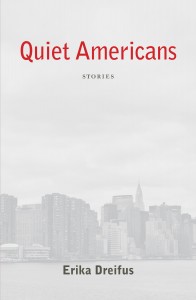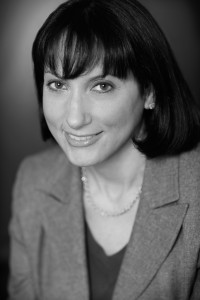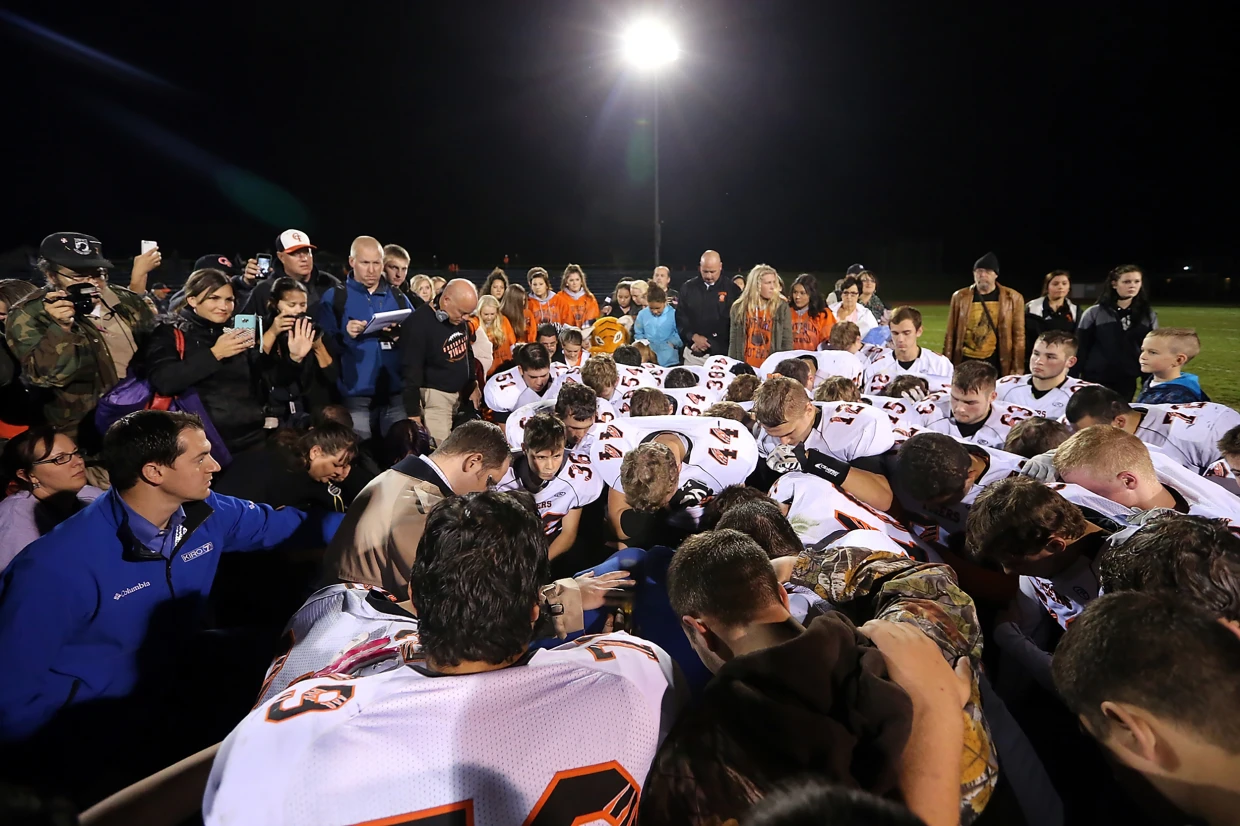The language is understated, never flowery. Yet Quiet Americans, the debut book of short stories by Erika Dreifus, is one of the most powerful books I have read that uses the Holocaust and its survivors as the driving force.
The book, published on Jan. 19 by Boston-based micro press Last Light Studio Books, has an incredible authenticity. It is fiction, but as good fiction should be, it is truth. Why? Erika, 41, writes what she knows. She is the third generation of paternal grandparents who escaped German persecution in 1937 and 1938. She has a doctoral degree in history, with World II as a focus, from Harvard. Today, I feature Erika and her book as part of her virtual book tour.
Full disclosure: In in the past year, I have gotten to know Erika through the Jewish blog world and a writing conference. Her two blogs, Practicing Writing, a collection of writing news and tips, and My Machberet, tidbits on the Jewish literary world, are housed on her website. Erika’s full-time gig is serving as director of communications in the academic affairs office at the City University of New York.
In 1997, in an interesting twist, she, her father, and sister all took on dual German citizenship, benefitting from a German law that allowed descendants of persecuted Germans to become citizens. In a subsequent article for The Boston Globe, Erika gives a sense of what would later influence her writing in Quiet Americans. She writes about growing up hearing her grandparents’ stories about Germany and the effect on her. After she moved from a predominantly Jewish neighborhood in Brooklyn to a non-Jewish suburb in New Jersey, she began having nightmares and fears, she wrote in the Globe piece. She had a recurring nightmare “in which the SS soldiers stormed into my suburban fourth-grade classroom, tore me from my desk, and isolated me – the only Jewish student in the class – to be taken away in a big black truck. Morning always came before the truck reached its destination.” And only years later, she writes, “did I realize that mine were not the only third-generation nightmares.”
In that Globe article, she writes of her internal conflict over whether to become a German citizen. “My struggle with German has been long, from the narratives and nightmares to the travel and language lessons.” In her artful book, Quiet Americans, she reveals so many different aspects of that struggle – the stories created from her dreams.
Below are excerpts from my recent interview with Erika:
Q: Given the Holocaust has been used so often now as fodder for fiction, what have you done to try to make your work different than the books already out there?
A: “The issue of how people are writing about the Holocaust, it’s not just me,” said Erika, noting that she was to be a member of a panel about the Holocaust and writers at an upcoming writers’ conference. “One of things we’ll look at is how are people two generations later writing about the Holocaust. I didn’t sit there and think about how am I going to make my work different. I just wrote my work. One of the ways it is different is it’s able to take a more historical look at things and look at other generations.
“I’ve seen lately more about the aspects about the story that weren’t so talked about, like the DP camps. There’s an element about displaced persons in my last story.
“It’s before, during, and after in a way. I’ve never written a scene that takes place in a camp. That’s not something I’ve felt comfortable doing.”
Q: Which books on the Holocaust – fiction or nonfiction – have had the most influence on you as a Jew – and as a writer?
A: “There isn’t one book. There are so many books. From my teenaged years, I was really influenced by the work of Elie Wiesel’s Night and other writings. One year my grandparents gave me a collection of Elie Wiesel writings. Elijah Visible, Thane Rosenbaum’s short story collection, was something I read. I found it very helpful to see how he had gone about it. The most recent book I admire is called Awake in the Dark, by Shira Nayman. I was just really blown away. … I have a Ph.D. in history and read a lot of history, French history, about the war years. It has come at me at a lot of different angles.”
Q: Several of your stories have this air of reconciliation. They show Holocaust survivors’ desire to somehow not just hate all Germans. For example, there’s Josef, who lets the POWs attend his son’s bris in the story, Lebensraum, and the doctor in “For Services Rendered” who writes to ask for leniency for a Nazi official and his wife. What messages are you hoping readers get from those examples?
A: I didn’t intend any messages there. In For Services Rendered, he states the question that he has. He’s really grappling with some moral issues. In his case, he comes down on one side. Certainly, his wife would have come down on the other side.
“In a way, it’s true that there are the stories about people who never want to go to Germany. In a way, I postponed learning German. I wasn’t keen on learning about it until I really had to. That’s almost a stereotype. Things aren’t just so black and white. That’s what I’m trying to get at it. It’s not just all hatred, all love. Life is just so much more complicated. These particular situations extenuate that complexity.”
Q: Quiet Americans, the story of a 3G’s 2004 visit to Germany, is by far my favorite story of the collection. Your voice as a writer is loud, clear. The tone is eerie, and you take a daring move, using the second person to narrate. It builds beautifully. How much of this is autobiographical?
A: “In this case, it just sort of came this way. It seemed like the natural way. When I started submitting that story to a variety of magazines, some editors wrote back, ‘Great story, but I personally can’t stand the second person.’ Not one, many times. People have some strong feelings about second person as readers.
“There are part of its that are definitely autobiographical. I did go to Stuttgart in 2004 after a conference. I have a terrible sense of direction so I like to take bus tours so I did take a bus tour. I did notice that there was a real emphasis on everything that had been rebuilt. I didn’t question it. I didn’t have the full reaction you’re able to present in the story.
“Plus I was having a discussion with a close friend after the trip, and he shared a similar experience on a German trip of his. I borrowed pieces from his story, and combined them with pieces of my story and added more pieces.”
Q: What’s your favorite story of the collection? Why?
A: “I honestly don’t have a favorite but one that is special to me in a way because it’s the only one my grandmother read is the Lebensraum story. I began working on that in the fall of 2001 when I was in my MFA program. I gave her a large print copy toward the end of the semester. She died in January 2002. She read it, and she called me up. She really just loved it. That one has a special place in my heart for that reason.”
Q: You quote Imre Kertesz at the start of the book saying, “Which writer today is not a writer of the Holocaust?” Explain your interpretation of that quote.
A: “In one way, I felt it helped validate what I was doing. There’s a lot that has been written about the Holocaust. Even one of my MFA readers was concerned that I was just writing too much about the same thing, that a lot of my stories were on the Holocaust, and an implication of that was that there is so much holocaust writing out there. Thankfully, another one of the MFA readers said, look, this is what your book is about, just go with it. I found that this quote for me in a sense gave me permission to continue with this work.
“There’s another great quote to the effect that there as many stories as there were victims. Everyone’s experience was unique, and in that sense, there’s just so many complications and deep experiences and nuances.”
To buy Erika’s book, go to this link. Portions of the proceeds from the book sales will be donated to The Blue Card, which supports survivors of Nazi persecution and their families in the United States.
Note: Photo of Erika Dreifus was taken by Lisa Hancock.






